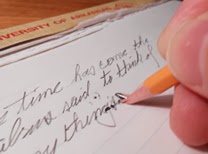Faster than vocabulary-ereader merged with elibrary
Ereaders are erasing the distinction between a book and a library. Readers are familiar with paper book sizes and weights that range from those that fit in the palm of a hand to paperback and textbook size to poster size. Now imagine digital equivalents of great variety, lighter weight and notably thinner, think clipboard thickness. More importantly, these devices will hold not just one book or article, but hundreds of books initially. Moore's Law (long article) will push this capacity into the stratosphere in the years ahead. The end of familiar careers? Not a chance. Now everyone will need a personal librarian and personal cataloging system. Everyone may also need the equivalent of personal first grade or primary level teachers to periodically update and review digital reading basics (long article).
The range of such devices currently extends from the iPod Touch and iPhone in the palm of the hand to the larger and more paperback to magazine sized reader products. They include: the readily available Kindles from Amazon.com, the scarce OLPC devices, Sony's PRS-300 and PRS-600, the expectation of a tablet computer from Apple and similar devices from PlasticLogic that will be promoted by Barnes & Knoble bookstores. The innovation in mobile information systems is just revving its engines. Much more is yet to come.
Change is coming faster than the vocabulary needed to talk about it. What should the term or phrase be for the merger of the ereader and the elibrary? ReadBrary? Librook? Use comments link below for suggestions!

Comments
I like the term "eLibrary." To me, the name still seems authentic, yet it's modern.
I like the inclusion of the word "library" to retain that sense of being a repository for texts, yet I feel like it should also reference the mobility of it all. Perhaps a compound word like "cloud-library" or "bookdrive," or a word like "moblibrary" using the root word meaning "to move" while also conveying that inter-connectivity.